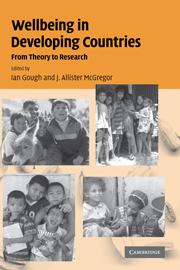Book contents
- Frontmatter
- Contents
- Figures
- Tables
- Notes on contributors
- Acronyms
- Preface
- Introduction
- 1 Theorising wellbeing in international development
- Part I Human needs and human wellbeing
- Part II Resources, agency and meaning
- Part III Quality of life and subjective wellbeing
- Conclusion: researching wellbeing
- 13 Researching wellbeing across the disciplines: some key intellectual problems and ways forward
- 14 Researching wellbeing: from concepts to methodology
- References
- Index
14 - Researching wellbeing: from concepts to methodology
Published online by Cambridge University Press: 22 September 2009
- Frontmatter
- Contents
- Figures
- Tables
- Notes on contributors
- Acronyms
- Preface
- Introduction
- 1 Theorising wellbeing in international development
- Part I Human needs and human wellbeing
- Part II Resources, agency and meaning
- Part III Quality of life and subjective wellbeing
- Conclusion: researching wellbeing
- 13 Researching wellbeing across the disciplines: some key intellectual problems and ways forward
- 14 Researching wellbeing: from concepts to methodology
- References
- Index
Summary
From concepts to methodology
This volume began by recalling the urgent policy challenges to eliminate extreme poverty in developing countries. The research programme around which this volume has been organised rests on the proposition that the concept of wellbeing is not only academically promising but also can be of practical policy value in both developed and developing worlds. Des Gasper, however, argues in Chapter 2 that if this is the case then two basic challenges must be met. The first is to demonstrate that the label of ‘wellbeing’ can be conceptually useful, or as he puts it ‘appealing’, to both academia and policy. The second is to answer, ‘When will it promote priority to the basic needs of the poorest and under what conditions?’ To achieve this, we contend, requires (a) combining different disciplinary perspectives to advance our understanding of wellbeing and (b) translating this into an agenda for empirical research. These are the topics of sections 14.3 and 14.4 of this chapter.
The formal objective of the Wellbeing in Developing Countries Research Group at the University of Bath has been to develop a conceptual and methodological framework for understanding the social and cultural construction of wellbeing in developing countries.
- Type
- Chapter
- Information
- Wellbeing in Developing CountriesFrom Theory to Research, pp. 316 - 350Publisher: Cambridge University PressPrint publication year: 2007
- 74
- Cited by

